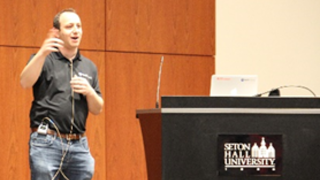Global Director of Tech Exploration Discusses Artificial Intelligence and Machine Learning at Anheuser-Busch InBev
Tuesday, November 26, 2019

Adam Spunberg, Global Director of Tech Exploration
On November 19, APICS (American Production and Inventory Control Society, now known as ASCM, Association for Supply Chain Management) hosted a representative from Anheuser-Busch InBev who specializes in artificial intelligence (AI) and machine learning innovation. The representative, Adam Spunberg, works out of the Newark office and is the global director of tech exploration.
In his position Spunberg monitors and oversees innovation in the supply chain area of the company. Additionally, he focuses on bringing the company together through new technology and using AI to do something spectacular that couldn't be done before. Through his experience, he has learned that innovation is a mixture of having great ideas and then generating support for those great ideas. Anheuser-Busch InBev has four main checkpoints for filtering these innovative ideas: idea prioritization, quality check, zone demand and direct sponsorship.
Idea prioritization focuses on filtering through ideas to find the most prominent and useful for the industry. Quality check ensures that the innovative idea doesn't exist in another company or at another Anheuser-Busch InBev location. Zone demand is analyzing which areas or satellite locations have the need for this innovation. Lastly, direct sponsorship refers to getting the support from the appropriate people needed within the company to move forward.
Building upon these checkpoints, Spunberg was able to share a variety of projects that Anheuser Busch InBev has been pursuing with the use of AI and machine learning. One project has included the use of AI video training. This project uses an online video library that has videos on how to complete every necessary task in the breweries. Using AI, the words spoken in these videos can be broken down into written text that becomes the captions in the video. Additionally, this AI software can translate both the audio and captions into another language.
Additionally, AI is being used to identify packaging defects within the factory assembly lines. This is achieved through a model that quickly snaps pictures of cans flowing through the assembly line. The software is then able to compare these pictures to existing pictures in order to determine if the individual can is in either good or bad quality. This allows the quality checking process for packaging defects to shift from manual labor to a technological feat.
Another use of AI is the advanced process control project, which offers a digital version of a production environment. More specifically, Anheuser Busch InBev replicates the environment of steam generation from a boiler in a model that accounts for the many variables expressed in the real-life environment. Once the digital environment is proven to be accurate to the real-life environment, then the proprietor can test different situations and events in this digital environment.
Spunberg also spoke about AI filtration optimization, which is not only applicable to Anheuser Busch InBev, but also many other companies and students. Anheuser Busch InBev utilizes Microsoft as their cloud computing basis. However, this prevents them from being able to utilize Google cloud and the services Google offers. In order to remedy this, AI has been used to develop new, cutting edge technology that creates an extra gateway layer that can process Google documents and data into Microsoft outputs.
As Spunberg concluded his presentation he emphasized, "Find your humanity in AI" -- highlighting the importance of giving back to less fortunate communities with the power that AI can bring. Using geo systems, Spunberg hopes to be able to optimize routes for the distribution of necessary supplies in third world countries. "Try to think about what you can do to leave your mark on the world and make life better for others."






